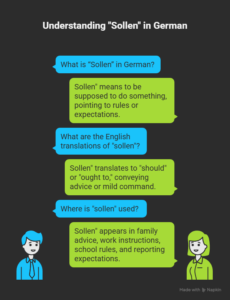Table of Contents
Ever wonder why German speakers give advice so directly? The modal verb “sollen” makes that possible. It turns simple statements into suggestions or duties. This guide covers “sollen in German” from basics to advanced tips. Readers will learn to use it right and avoid errors. Stick around to master this key verb and speak German with confidence.
Ready to take your German skills to the next level? Get Free Demo Classes Here!
Introduction
“Sollen” is a German modal verb. It helps form sentences about what people should do. This verb plays a big role in daily talks. It shows obligation, suggestion, or advice. Without it, German conversations feel flat. “Sollen in German” appears in advice like “You should eat healthy.” It also fits formal settings. This guide breaks it down step by step. Learners will see how to conjugate and use it. By the end, anyone can apply “sollen in German” smoothly.
What is “Sollen” in German?
1: How do you say "Good Morning" in German?
“Sollen” holds a spot among six modal verbs in German. These verbs change the main verb’s meaning. They add shades like need or permission.
Definition
The word “sollen” means to be supposed to do something. It points to rules or expectations. People use it to say what is right or expected. For example, a parent might say, “You should clean your room.” Here, “sollen” sets a duty.
English Translation(s)
In English, “sollen” translates to “should” or “ought to.” Both words carry a sense of advice or mild command. “Should” fits casual talks. “Ought to” sounds a bit stronger, like a moral push. Not all cases match perfectly. Context decides the best word. For instance, “Du solltest lernen” becomes “You should study.” This keeps the intent clear.
Usage Context
“Sollen” shows up in many places. It appears in family advice, work instructions, or school rules. Think of a boss saying, “You should finish the report.” It also reports what others expect. Like, “My teacher says I should read more.” In stories, it describes plans. “The team should win the game.” This verb avoids strong force. It suggests rather than demands. That makes it polite. Learners find it useful for everyday German. It helps build natural speech patterns. Without “sollen,” sentences lack nuance. People might sound too harsh or vague. Use it to express ideas with care.
This verb fits both spoken and written German. In emails, it softens requests. “You should check the file.” In books, it explains duties. Context shapes its strength. In close relationships, it feels like a tip. In official spots, it acts like a rule. “Sollen in German” connects to culture too. Germans value direct advice. This verb lets speakers give it without offense. Practice it to grasp German mindset. It opens doors to better chats.
Free German A1 Mock Tests – Powered by AI!
Test your skills on our interactive platform. Get instant feedback from our AI to help you communicate better and track your progress. Start your free German mock test now.
Test Your German A1 for FreeConjugation of Sollen
Conjugation changes “sollen” based on who acts and when. Modal verbs follow set patterns. They pair with infinitives at the end of sentences. Learn these forms to build correct sentences.
Present Tense
In present tense, “sollen” shifts for each pronoun. It shows current suggestions.
- Ich soll (I should)
- Du sollst (You should, informal singular)
- Er/sie/es soll (He/she/it should)
- Wir sollen (We should)
- Ihr sollt (You should, informal plural)
- Sie/Sollen (They/you should, formal)
These forms stay simple. The stem “soll” adds endings like -st for du.
Simple Past (Präteritum)
Simple past tells about past advice. It uses “sollte” as the base.
- Ich sollte (I should have)
- Du solltest (You should have, informal singular)
- Er/sie/es sollte (He/she/it should have)
- Wir sollten (We should have)
- Ihr solltet (You should have, informal plural)
- Sie/Sie sollten (They/you should have, formal)
This tense fits stories or reports. It recalls old duties.
|
German A2 Exercises – Download Free PDF |
||
Perfect Tense (with Auxiliary Verb “haben”)
Perfect tense uses “haben” plus “gesollt.” It describes completed actions.
- Ich habe gesollt (I should have)
- Du hast gesollt (You should have, informal singular)
- Er/sie/es hat gesollt (He/she/it should have)
- Wir haben gesollt (We should have)
- Ihr habt gesollt (You should have, informal plural)
- Sie/Sie haben gesollt (They/you should have, formal)
This form is rare in speech. Books use it more for past obligations.
For easy reference, here is a table with all conjugations:
| Tense | Ich | Du | Er/sie/es | Wir | Ihr | Sie/Sie |
|---|---|---|---|---|---|---|
| Present | soll | sollst | soll | sollen | sollt | sollen |
| Simple Past | sollte | solltest | sollte | sollten | solltet | sollten |
| Perfect | habe gesollt | hast gesollt | hat gesollt | haben gesollt | habt gesollt | haben gesollt |
This table helps quick lookups. Print it for study sessions. Conjugation builds strong grammar skills. Master it to form full sentences. Errors drop when forms stick in memory.
Usage Rules of Sollen
Rules guide “sollen” in sentences. Follow them for clear meaning. Break them, and talks confuse.
Expressing Advice or Obligation
“Sollen” gives tips or sets light duties. It pushes action without force. Rule: Place “sollen” before the main verb infinitive.
Example: “Du sollst Wasser trinken.” (You should drink water.) This advises health.
Another: “Wir sollen pünktlich sein.” (We should be on time.) It sets group expectation.
Use it for personal goals too. “Ich soll mehr Sport machen.” (I should exercise more.) This shows self-advice.
Indirect Speech (Reporting Someone’s Advice)
“Sollen” reports what others say. It shifts to third person. Rule: Keep “sollen” in present for ongoing advice.
Example: “Er sagt, ich soll kommen.” (He says I should come.) This quotes a suggestion.
In past: “Sie meinte, du solltest ruhen.” (She thought you should rest.) It recalls advice.
This rule fits news or chats. It makes reports smooth.
Differences from Similar Modal Verbs (müssen, dürfen, wollen)
“Sollen” differs from others. Müssen means must, for strong need. Dürfen means may, for permission. Wollen means want, for desire.
Rule: Choose “sollen” for external advice. Use müssen for inner duty.
Example: “Du musst gehen.” (You must go.) Stronger than “Du sollst gehen.” (You should go.)
For permission: “Du darfst spielen.” (You may play.) Not advice like “sollen.”
Wollen shows wish: “Ich will essen.” (I want to eat.) “Sollen” lacks personal drive.
These differences matter. Pick the right verb for exact meaning. Practice swaps to see shades.
Short rules keep it simple. Always end with infinitive. Stem changes little. Context picks strength. Examples show real use. Apply them in talks for fluency.
Common Mistakes Learners Make
Learners trip on “sollen.” Fix these to speak better.
Misuse with Personal Pronouns
Pronouns pair wrong with forms. Rule: Match conjugation to subject.
Wrong: “Ich sollst kommen.” Right: “Ich soll kommen.”
This error stems from English habits. German demands exact matches. Practice charts to avoid it.
Example: For “ihr,” use “sollt.” “Ihr sollt lernen.” Not “Ihr sollen.”
Spot this in writing. It breaks flow.
Confusing Sollen with Müssen
Mix-ups happen with duty verbs. “Sollen” suggests. Müssen demands.
Wrong: “Ich soll zur Arbeit gehen.” If forced, say “muss.”
Example: Advice: “Du solltest helfen.” Need: “Du musst helfen.”
Listen to natives. They stress “müssen” harder. This clue helps choose.
Incorrect Word Order
Word order shifts in questions or negations. Rule: “Sollen” goes second in main clauses.
Wrong: “Nicht du sollst essen.” Right: “Du sollst nicht essen.”
In questions: “Soll ich gehen?” Not “Ich soll gehen?”
Sub clauses put infinitive first, then “sollen.” “Ich denke, dass du kommen sollst.”
These fixes make speech natural. Review sentences daily. Errors fade with time.
Common slips hurt confidence. Spot them early. Use apps for checks. Progress comes fast.
Free German A1 Mock Tests – Powered by AI!
Test your skills on our interactive platform. Get instant feedback from our AI to help you communicate better and track your progress. Start your free German mock test now.
Test Your German A1 for FreeSollen in Sentences – Practical Examples
Examples show “sollen” at work. See it in real spots.
Daily Conversation Examples
In talks, “sollen” gives quick tips.
“Du sollst mehr schlafen.” (You should sleep more.) A friend says this after a long day.
“Wir sollen einkaufen gehen.” (We should go shopping.) Family plans it.
“Ich soll das Buch lesen.” (I should read the book.) Self-reminder for homework.
These fit casual chats. They keep bonds strong.
Formal vs. Informal Usage
Informal uses “du” forms. Formal picks “Sie.”
Informal: “Du sollst pünktlich sein.” To a kid.
Formal: “Sie sollen den Termin einhalten.” To a client.
Switch based on respect. Work needs formal. Friends take informal.
This choice shows culture. Germans note it.
Examples in Questions and Negations
Questions seek advice. “Soll ich das machen?” (Should I do that?)
Negations block action. “Du sollst nicht rauchen.” (You should not smoke.)
Past question: “Solltest du kommen?” (Should you have come?)
Negation in report: “Er soll nicht lügen.” (He should not lie.)
Mix them for practice. Questions build dialogue. Negations add limits.
Sentences grow skills. Read aloud for rhythm. Write your own for depth.
|
Goethe 2025 Exam Dates: Multiple Test Centers |
|
| Trivandrum Goethe Exam Dates | Kochi Goethe Exam Dates |
| Chennai Goethe Exam Dates | Coimbatore Goethe Exam Dates |
Sollen in Idioms & Expressions (Optional for Advanced Learners)
Advanced users find “sollen” in fixed phrases. These add flavor.
“Es soll regnen.” (It should rain.) Means weather forecast.
“Das soll heißen.” (That should mean.) Explains terms.
“Wie es scheint, soll er reich sein.” (As it seems, he should be rich.) Reports rumors.
“Man soll nicht alles glauben.” (One should not believe everything.) Wise saying.
These idioms spice talks. Learn them for native feel. Books and shows use them often.
Spot patterns. “Sollen” in rumors shows hearsay. Practice in context.
Comparison Table
Tables clarify differences. Compare “sollen,” “müssen,” “dürfen.”
| Verb | Meaning | Strength | Example Sentence | Translation |
|---|---|---|---|---|
| Sollen | Should (advice) | Mild | Du sollst essen. | You should eat. |
| Müssen | Must (need) | Strong | Du musst essen. | You must eat. |
| Dürfen | May (permission) | Neutral | Du darfst essen. | You may eat. |
This setup shows quick contrasts. “Sollen” for tips. “Müssen” for rules. “Dürfen” for okay.
Another row: Past forms.
| Verb | Past Example | Translation |
|---|---|---|
| Sollen | Du solltest essen. | You should have eaten. |
| Müssen | Du musstest essen. | You had to eat. |
| Dürfen | Du durftest essen. | You were allowed to eat. |
Use this to pick verbs fast. It saves time in learning.
Practice Exercises / Quiz
Test knowledge with these. Fill blanks or choose right.
- Fill in: “Du _____ (sollen) das Licht ausmachen.” Answer: sollst. (You should turn off the light.)
- Multiple choice: Ich _____ mehr Wasser trinken. a) soll b) muss c) darf. Answer: a) soll. (I should drink more water.)
- Fill in past: Wir _____ (sollen) früher kommen. Answer: sollten. (We should have come earlier.)
- Choose: Er sagt, sie _____ nicht gehen. a) soll b) will c) kann. Answer: a) soll. (He says she should not go.)
- Fill in question: _____ ich helfen? (sollen). Answer: Soll. (Should I help?)
- Multiple choice: In formal: Sie _____ den Bericht lesen. a) sollen b) sollt c) sollte. Answer: a) sollen. (You should read the report.)
- Fill in negation: Du _____ nicht lügen. (sollen). Answer: sollst. (You should not lie.)
- Choose difference: For permission, use: a) sollen b) dürfen c) müssen. Answer: b) dürfen.
- Fill in perfect: Ich habe _____ (sollen) lernen. Answer: gesollt. (I should have studied.)
- Multiple choice: Advice from mom: “Du _____ Gemüse essen.” a) sollst b) musst c) darfst. Answer: a) sollst. (You should eat vegetables.)
Do these often. Check answers. Wrong ones mean review sections. This builds habit. Repeat for mastery.
Ready to take your German skills to the next level? Get Free Demo Classes Here!
Conclusion
“Sollen in German” boosts speaking skills. It handles advice and duties well. Key points include its definition as a modal verb, conjugations in tenses, and rules for use. Differences from müssen and dürfen stand out. Examples and tables make it clear. Avoid mistakes like wrong order or pronoun mixes. Idioms add depth for pros. Practice exercises lock it in.
Put this to work now. Talk with friends or write notes. Skills grow with use. Check more guides on German verbs. Grab resources for full lessons. Start today and see progress.
Free German A1 Mock Tests – Powered by AI!
Test your skills on our interactive platform. Get instant feedback from our AI to help you communicate better and track your progress. Start your free German mock test now.
Test Your German A1 for FreeFrequently Asked Questions
What does "sollen" mean in German, and why is it important for learners?
“Sollen in German” is a modal verb that translates to “should” or “ought to” in English. It expresses advice, suggestions, or light obligations, making it a key part of everyday conversations. For example, saying “Du sollst mehr lernen” means “You should study more,” offering a suggestion without sounding forceful. This verb is crucial because it helps learners sound polite and natural when giving advice or reporting expectations. Unlike English, where “should” can feel vague, “sollen” fits specific contexts like family talks, workplace instructions, or school rules. It reflects German culture’s direct yet courteous way of communicating duties. Learners need “sollen” to build sentences that connect with native speakers. Without it, advice can sound too harsh or unclear. Mastering “sollen in German” opens doors to smoother chats and shows respect for cultural norms. Practice it in daily sentences to gain confidence and fluency.
How do you conjugate "sollen" in German across different tenses?
Conjugating “sollen in German” is straightforward but requires attention to match pronouns and tenses. In the present tense, it changes based on the subject: “ich soll” (I should), “du sollst” (you should), “er/sie/es soll” (he/she/it should), “wir sollen” (we should), “ihr sollt” (you all should), and “sie/Sie sollen” (they/you formal should). For example, “Wir sollen helfen” means “We should help.” In the simple past (Präteritum), the base is “sollte”: “ich sollte,” “du solltest,” “er/sie/es sollte,” and so on, like “Du solltest kommen” (You should have come). The perfect tense uses “haben” with “gesollt,” though it’s less common in speech: “Ich habe gesollt” (I should have). Each tense fits different situations, like giving current advice or recalling past suggestions. Mistakes happen when learners mix endings, like saying “ich sollst” instead of “ich soll.” Use a conjugation table and practice with sentences to get it right. Regular review helps lock in these forms for fluent speaking.
How is "sollen" different from other modal verbs like "müssen" and "dürfen"?
“Sollen in German” stands apart from other modal verbs like “müssen” (must) and “dürfen” (may) in meaning and tone. “Sollen” suggests advice or external expectations, like “Du sollst pünktlich sein” (You should be on time), which feels like a friendly tip. “Müssen” shows a stronger need or rule, as in “Du musst pünktlich sein” (You must be on time), implying no choice. “Dürfen” grants permission, like “Du darfst gehen” (You may go), which allows action rather than advising it. Another modal, “wollen” (want), expresses desire: “Ich will gehen” (I want to go). Choosing the wrong verb can change the message. For instance, using “müssen” instead of “sollen” might sound too bossy in casual settings. “Sollen in German” is perfect for polite suggestions or reporting what others expect, like “Er sagt, ich soll lernen” (He says I should study). Practice swapping these verbs in sentences to feel their differences and avoid mix-ups.
What are some common mistakes learners make with "sollen in German"?
Learners often stumble when using “sollen in German” due to its unique rules. One big mistake is mismatching pronouns with conjugations. For example, saying “ich sollst” instead of “ich soll” breaks the grammar rule, as “sollst” pairs with “du.” Another error is confusing “sollen” with “müssen.” “Sollen” suggests, like “Du sollst essen” (You should eat), while “müssen” demands, as in “Du musst essen” (You must eat). Using “sollen” for a must-do task sounds weak. Word order also trips people up. In main clauses, “sollen” comes second, like “Du sollst nicht lügen” (You should not lie). In questions, it leads: “Soll ich kommen?” (Should I come?). Sub clauses flip the order, placing the infinitive first: “Ich denke, dass du kommen sollst.” These mistakes confuse listeners. To fix them, practice with examples and check sentences against conjugation tables. Apps or flashcards help catch errors early.
How can "sollen" be used in everyday German conversations?
“Sollen in German” shines in daily talks for giving advice or sharing expectations. It’s versatile for casual and formal settings. At home, someone might say, “Du sollst mehr Wasser trinken” (You should drink more water) to a friend, sounding caring but not pushy. At work, “Sie sollen die Datei prüfen” (You should check the file) keeps instructions polite. It also reports advice, like “Mein Lehrer sagt, ich soll üben” (My teacher says I should practice). In questions, it seeks guidance: “Soll ich das kaufen?” (Should I buy this?). Negations work too: “Du sollst nicht so laut sein” (You should not be so loud). These examples show “sollen” fits quick chats or long talks. It softens suggestions, making them feel friendly. To use it well, pair it with common verbs like “gehen” (go), “lernen” (study), or “helfen” (help). Practice in real-life scenarios, like texting a German friend, to make it second nature.
How does "sollen" work in formal versus informal German settings?
“Sollen in German” adapts to the setting, balancing politeness and context. In informal situations, like with friends, use “du” or “ihr” forms: “Du sollst das Buch lesen” (You should read the book) or “Ihr sollt kommen” (You all should come). These feel like tips among peers. In formal settings, like work or addressing strangers, use “Sie”: “Sie sollen den Vertrag prüfen” (You should review the contract). This keeps respect high, as Germans value formal speech in professional or unfamiliar contexts. The verb’s conjugation stays consistent, but the pronoun sets the tone. Mistakes happen when learners use “du” in formal spots, which can seem rude. For example, saying “Du sollst das machen” to a boss is wrong; use “Sie sollen.” Context matters too. In a family, “sollen” sounds like advice. In an office, it feels like a soft rule. Practice both by writing emails (formal) and texts (informal) to see the shift. This builds cultural awareness and smooth communication.
What role does "sollen" play in indirect speech or reported advice?
“Sollen in German” is a go-to for reporting what others say about duties or advice. It shifts direct speech into indirect, keeping the message clear. For example, if someone says, “Lern mehr!” (Study more!), it becomes “Er sagt, ich soll mehr lernen” (He says I should study more). The verb “sollen” stays in the present tense for ongoing advice, even if the original was past. Another case: “Sie meinte, wir sollten früher ankommen” (She thought we should arrive earlier) uses the past form “sollten” for past advice. This structure is common in stories, news, or chats about what others expect. The rule is simple: use “sollen” after a reporting verb like “sagen” (say) or “meinen” (think), followed by the infinitive. Mistakes happen when learners forget the infinitive or use wrong tenses. Practice by rewriting direct quotes into indirect speech. This skill makes conversations richer and shows fluency in reporting ideas.
Are there idioms or expressions with "sollen" that learners should know?
Advanced learners can boost their skills with idioms using “sollen in German.” These fixed phrases add a native touch. One common expression is “Es soll regnen” (It should rain), meaning a weather prediction. Another is “Das soll heißen” (That should mean), used to explain or clarify something, like “Das soll heißen, wir müssen warten” (That means we have to wait). In rumors, “Er soll reich sein” (He should be rich) suggests hearsay without proof. A wise saying is “Man soll nicht alles glauben” (One should not believe everything), teaching caution. These phrases pop up in books, shows, or casual talks, making them worth learning. They show how “sollen” stretches beyond advice to special meanings. To master them, listen to German podcasts or read news for context. Write your own sentences with these idioms to blend them into speech naturally. They make talks lively and authentic.
How can learners practice "sollen in German" effectively?
Practicing “sollen in German” builds confidence and fluency. Start with simple sentences like “Ich soll lernen” (I should study) and expand to complex ones like “Er sagt, dass ich mehr üben soll” (He says I should practice more). Use conjugation tables to drill forms: “soll,” “sollst,” “sollte,” etc. Write daily examples, mixing tenses and contexts, such as “Du solltest das sehen” (You should see this) for past advice. Try speaking with native speakers or language apps to hear “sollen” in action. For instance, ask, “Soll ich das machen?” (Should I do that?) in chats. Fill-in-the-blank exercises, like “Wir _____ (sollen) helfen,” reinforce grammar. Watch German shows to spot “sollen” in dialogue. Mistakes like wrong word order (“Ich soll nicht gehen” instead of “Ich soll nicht gehen”) fade with repetition. Keep a notebook for new sentences and review weekly. This hands-on approach makes “sollen” stick and boosts overall German skills.
Why should learners focus on mastering "sollen" early in their German studies?
“Sollen in German” is a must-learn early because it’s common and versatile. It shapes polite advice, like “Du sollst mehr lesen” (You should read more), which fits family, school, or work talks. Unlike “müssen,” which feels strict, “sollen” softens suggestions, making it ideal for building relationships. It also appears in reported speech, like “Sie sagt, ich soll kommen” (She says I should come), a frequent structure in conversations. Mastering it helps learners avoid sounding too blunt or confusing it with other modals like “dürfen” (may). Early focus builds a strong base for grammar, as “sollen” follows modal verb rules, like placing infinitives at sentence ends. It also reflects German culture’s value of clear, respectful advice. Practice through quizzes, writing, and speaking to make it natural. Learners who grasp “sollen” early speak with more confidence and connect better with native speakers. Start now to unlock fluent, polite German.












